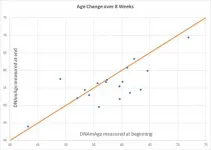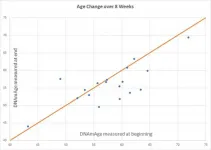(Press-News.org) Australian researchers recently reported a sharp decline in the abundance of coral along the Great Barrier Reef. Scientists are seeing similar declines in coral colonies throughout the world, including reefs off of Hawaii, the Florida Keys and in the Indo-Pacific region.
The widespread decline is fueled in part by climate-driven heat waves that are warming the world's oceans and leading to what's known as coral bleaching, the breakdown of the mutually beneficial relationship between corals and resident algae.
But other factors are contributing to the decline of coral reefs, as well, including pollution and overfishing.
According to a new study, "Local conditions magnify coral loss after marine heatwaves," published in the journal Science, what's key to coral reefs surviving climate-driven heatwaves and subsequent bleaching is managing global climate change--and local conditions.
"We found a strong signal that local conditions influenced outcomes for corals after heat-stress events," said Mary Donovan, lead author of the study and assistant professor in the School of Geographical Sciences and Urban Planning at Arizona State University.
"Although some have argued that climate change is so overwhelming that conserving coral reefs on a local scale is futile, our study found that local impacts on coral reefs magnified the effects of climate-driven heatwaves," said Donovan. "This suggests that local action to conserve coral reefs can help reefs withstand the effects of climate change."
The importance of local conditions to reef survival is often dismissed, making those who rely on coral reefs for their livelihood or those who are stewards of the reefs feel hopeless. Yet, coral reefs are profoundly important.
"Coral reefs are important on a fundamental level for biodiversity," said Donovan, who is also a member of ASU's Center for Global Discovery and Conservation Science.
Two local issues that can have a large effect on the health of coral reefs are nutrient pollution and overfishing. Overfishing depletes the number of fish that eat algae and keep the reef's ecosystem in balance. For example, depleting the number of herbivorous fish can lead to an overabundance of macroalgae, which can indicate a stressed ecosystem.
Meanwhile, nutrient pollution from land, including run off from golf courses, agriculture and urban development along coastlines greatly threatens reefs.
However, both overfishing and pollution offer opportunities for management strategies that could boost coral reefs' resistance to climate change.
Study data were collected world-wide by professional scientists as well as trained and certified community-scientists on behalf of Reef Check. Only data collected during and within one year after a climate-driven bleaching event were analyzed to determine the health of the reef. Donovan is now applying this research to local efforts to address conditions that harm reefs.
"Coral reefs take up some of the smallest area on our planet, but harbor the most species of any ecosystem on Earth, and they're also incredibly important to people. People all over the world rely on reefs for food security, for coastal protection from storms, and for other livelihoods. In many parts of the world, it isn't only a question of beauty, but a question of survival."
INFORMATION:
Co-authors include Deron Burkepile, Marine Science Institute, University of California, Santa Barbara, and Department of Ecology, Evolution, and Marine Biology, University of California, Santa Barbara; Chelsey Kratochwill, Tom Shlesinger, Shannon Sully and Robert van Woesik, Institute for Global Ecology, Florida Institute of Technology, Melbourne, FL; Thomas Oliver, Ecosystem Science Division, Pacific Islands Fisheries Science Center, NOAA Fisheries, Honolulu, HI; Gregor Hodgson, Reef Check Foundation, Marina del Rey, CA; Jan Freiwald, Reef Check Foundation, Marina del Rey, CA, and Institute of Marine Sciences, University of California Santa Cruz, CA
The research was funded by the National Science Foundation and a grant from the Zegar Family Foundation.
HOUSTON - (May 27, 2021) - One hundred fifty years ago, Dmitri Mendeleev created the periodic table, a system for classifying atoms based on the properties of their nuclei. This week, a team of biologists studying the tree of life has unveiled a new classification system for cell nuclei and discovered a method for transmuting one type of cell nucleus into another.
The study, which appears this week in the journal Science, emerged from several once-separate efforts. One of these centered on the DNA Zoo, an international consortium spanning dozens of institutions including Baylor College of ...
Many seabirds in the Northern Hemisphere are struggling to breed -- and in the Southern Hemisphere, they may not be far behind. These are the conclusions of a study, published May 28 in Science, analyzing more than 50 years of breeding records for 67 seabird species worldwide.
The international team of scientists -- led by William Sydeman at the Farallon Institute in California -- discovered that reproductive success decreased in the past half century for fish-eating seabirds north of the equator. The Northern Hemisphere has suffered greater impacts from human-caused climate change and other human activities, like overfishing.
Seabirds include albatrosses, puffins, murres, penguins and other birds. Whether they ...
A new paper, published recently in PLOS Computational Biology by a team including UMass Amherst researchers, seeks to help scientists structure their lab-group meetings so that they are more inclusive, more productive and, ultimately, lead to better science.
The word "scientist" might conjure images of lab-coated researchers tending bubbling beakers or building supercomputers, but an enormous amount of scientific work takes place around a conference table during weekly group meetings. "There is plenty of good research showing that diversity and inclusion make the science itself better," says Kadambari Devarajan, one of the paper's co-lead authors and a graduate ...
The blood-brain barrier is impermeable to cholesterol, yet high blood cholesterol is associated with increased risk of Alzheimer's disease and vascular dementia. However, the underlying mechanisms mediating this relationship are poorly understood. A study published in the open-access journal PLOS Medicine by Vijay Varma and colleagues at the National Institute on Aging, part of the National Institutes of Health, in Baltimore, Maryland, suggests that disturbances in the conversion of cholesterol to bile acids (called cholesterol catabolism) may play a role in the development of dementia.
Little ...
Quantum systems are considered extremely fragile. Even the smallest interactions with the environment can result in the loss of sensitive quantum effects. In the renowned journal Science, however, researchers from TU Delft, RWTH Aachen University and Forschungszentrum Jülich now present an experiment in which a quantum system consisting of two coupled atoms behaves surprisingly stable under electron bombardment. The experiment provide an indication that special quantum states might be realised in a quantum computer more easily than previously thought.
The so-called decoherence is one of the greatest enemies of the quantum physicist. Experts understand by this the decay of quantum states. This inevitably occurs when the system interacts with its environment. In ...
A groundbreaking clinical trial shows we can reduce biological age (as measured by the Horvath 2013 DNAmAge clock) by more than three years in only eight weeks with diet and lifestyle through balancing DNA methylation. A first-of-its-kind, peer-reviewed study provides scientific evidence that lifestyle and diet changes can deliver immediate and rapid reduction of our biological age. Since aging is the primary driver of chronic disease, this reduction has the power to help us live better, longer. The study, released on April 12, utilized a randomized controlled clinical trial conducted among 43 healthy adult males between the ages of 50-72. The 8-week treatment program included diet, sleep, exercise and relaxation ...
The bacterium, which they named Candidatus Phytoplasma dypsidis was found to cause a fatal wilt disease. This new discovery was reported in the International Journal of Systematic and Evolutionary Microbiology.
In 2016, several ornamental palms within a conservatory in the Cairns Botanic Gardens, Queensland, died mysteriously. A sample was taken from one of the diseased plants and investigated by Dr Richard Davis and colleagues from the Australian Government Department of Agriculture, Water and the Environment, and state and local government. They compared the characteristics and genome of the bacterium identified as the cause of the disease and found the ...
Study Exploring Optimization of Duplex Velocity Criteria for Diagnosis of Internal Carotid Artery (ICA) Stenosis Published Online
Online first in Vascular Medicine, researchers from the Intersocietal Accreditation Commission (IAC) Vascular Testing division report findings of their multi-centered study of duplex ultrasound for diagnosis of internal carotid artery (ICA) stenosis. 1
The study was developed in response to wide variability in the diagnostic criteria used to classify severity of ICA stenosis across vascular laboratories nationwide and following a survey of members of IAC-accredited ...
Aging published "Potential reversal of epigenetic age using a diet and lifestyle intervention: a pilot randomized clinical trial" which reported on a randomized controlled clinical trial conducted among 43 healthy adult males between the ages of 50-72. The 8-week treatment program included diet, sleep, exercise and relaxation guidance, and supplemental probiotics and phytonutrients. Genome-wide DNA methylation analysis was conducted on saliva samples using the Illumina Methylation Epic Array and DNAmAge was calculated using the online Horvath DNAmAge clock (also published in Aging). The diet and lifestyle treatment was associated with a 3.23 years decrease in DNAmAge compared with controls. DNAmAge of those in the treatment group decreased by an average 1.96 ...
More than 500,000 people have died from COVID-19 in Latin America and the Caribbean, demonstrating the health and economic inequalities throughout the region. A new article analyzes seven books* that discuss these inequalities, including questions of who gets health care and what interdependent roles societies, social movements, and governments play. To end inequality in the region, the author calls for a universal approach to health care.
The article, by a professor at Carnegie Mellon University (CMU), appears in the June 2021 issue of Latin American Research Review, a journal published by the Latin American Studies Association.
"These books break new ground and contribute to our understanding of some of the most important health ...





